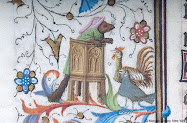For friends and family, I'll be posting updates (and hopefully photos, if I can get my iPad to cooperate) as I travel, so don't be disappointed if you don't get any postcards! (They're in the post, I swear...)
A bientôt !
The musings of a feminist medievalist contrarian historian oenophile francophile fromage-fancier.
"And now those in whom Richard, late king, did put his trust for help were fallen. And when he heard thereof, he grieved more sorely and mourned even to death, which came to him most miserably on the last day of February, as he lay in chains in the castle of Pontefract, tormented by Sir Thomas Swinford with starving fare."*That reference to the chains makes it all sound more than a bit suspicious, but perhaps it was just being stuck in Pontefract that made Richard lose the will to live. There’s less doubt about the death of his uncle, the duke of Gloucester, whose alleged murder – by being held down and smothered with a featherbed – is rather gruesomely recounted in the Rolls of Parliament, along with numerous accusations and counter-accusations of treason. I’ve been rather struck by Paul Binski's explanation of why drawing and quartering was the preferred penalty for condemned traitors. Noting the connection between the king’s body as both an individual, mortal body and the microcosm of the immortal body politic of the realm, he points out that monarchs “had the power to divide others who threatened the body politic with division.”** It's a timely and somewhat chilling reminder that the texts and discourses that so often preoccupy us as researchers had material, visceral impacts on historical human flesh.
 On Friday, I wetted the baby's head, so to speak, by presenting my research project at my School's annual postgraduate research seminar. I was speaking at 10am, and while I was listening to the students who went before me, I went through a few angsty moments of self-doubt, thinking, "do I really have an argument here?" and "all these people going to think my ideas are whack". But, in the end, it went really well and I got a lot of positive feedback (including from the Dean of the Graduate Research School, who asked some good questions that allowed me to bring in a few choice points I'd had to remove from my original presentation to keep it within the time limit. Very gratifying.)
On Friday, I wetted the baby's head, so to speak, by presenting my research project at my School's annual postgraduate research seminar. I was speaking at 10am, and while I was listening to the students who went before me, I went through a few angsty moments of self-doubt, thinking, "do I really have an argument here?" and "all these people going to think my ideas are whack". But, in the end, it went really well and I got a lot of positive feedback (including from the Dean of the Graduate Research School, who asked some good questions that allowed me to bring in a few choice points I'd had to remove from my original presentation to keep it within the time limit. Very gratifying.)
“I and my tribe are the present expression of our tupuna [ancestors] and the source of our uri, our descendants. We are both past and future, as well as ourselves…To inquire into my history or that of my people, you must inquire into my whakapapa. My tupuna may be dead but they are also in me and I am alive. To know them, you must know me! In order to deal with them, you must deal with me!”
 It’s Quatorze Juillet, and I’m celebrating Bastille Day by watching the six hours of Tour de France coverage I taped overnight. I enjoy watching other cycling events, like the Giro d’Italia and that uniquely gruelling madness known as the ‘Hell of the North’ - the one-day classic from Paris to Roubaix that is distinguished by the bone-shattering, tire-tearing sections ridden over the narrow cobbled pavé. There, the weather gods frequently conspire to produce a combination of rain and cold that is misery for road cyclists (though it makes for great entertainment for us armchair athletes).
It’s Quatorze Juillet, and I’m celebrating Bastille Day by watching the six hours of Tour de France coverage I taped overnight. I enjoy watching other cycling events, like the Giro d’Italia and that uniquely gruelling madness known as the ‘Hell of the North’ - the one-day classic from Paris to Roubaix that is distinguished by the bone-shattering, tire-tearing sections ridden over the narrow cobbled pavé. There, the weather gods frequently conspire to produce a combination of rain and cold that is misery for road cyclists (though it makes for great entertainment for us armchair athletes).